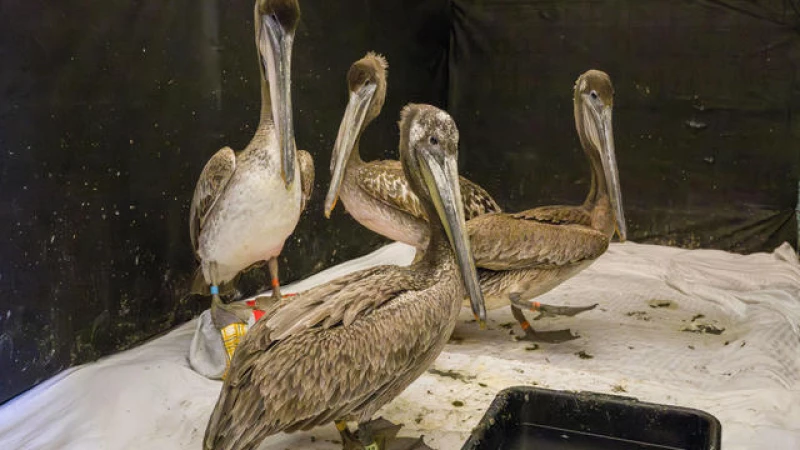Amidst the sunny beaches of Southern California, a puzzling phenomenon has emerged as dozens of brown pelicans have been discovered stranded, causing a strain on wildlife care facilities in the region.
Huntington Beach's Orange County Wetlands and Wildlife Center is grappling with an influx of distressed pelicans, with twenty-four new patients arriving just on Monday. This surge is part of a larger trend of brown pelicans being found in distress, overwhelming the dedicated staff and volunteers who have been tirelessly working to rescue over 150 birds since the beginning of April.
"Due to an extended mass-stranding event, the Wetlands and Wildlife Care Center is caring for dozens of Brown Pelicans flooding in from Orange, Riverside, and San Bernardino Counties," shared a statement from the wildlife center. "The cause of this event is unknown."
Recent reports indicate that the majority of the affected pelicans have been discovered within the past week, with close to 90 new arrivals seeking assistance.
"A lot of birds are coming in to care who are emaciated, they're dehydrated, they're hypothermic, they're anemic, they're in poor body condition, they're starving," expressed Elizabeth Wood, a veterinarian at the center.
Thus far, the cause of the widespread event remains unknown, but Wood draws parallels to a similar mass-stranding incident two years ago.
"There are various hypotheses being considered, but it appears that there is a shortage of fish," she explained. "Some theories point to the strong winds, others to the fish supply, or even the ocean temperatures."
The influx of birds has necessitated the creation of special facilities to accommodate them during their care. The center reports that each patient costs $45 per day, and with 28 birds currently under treatment and more anticipated, they are seeking public assistance to cover the substantial expenses.
"Urgent financial support is essential to address this situation," emphasized center officials.
The initial hours of care are critical for the large seabirds, with over 50 reported deaths shortly after arrival, as per the center's records.
Wood mentioned that by providing supplemental heat to raise the birds' body temperature, they are likely to positively respond to the care they receive.
Once the birds regain normal body temperature and begin feeding independently, they are released back to the beaches where they were rescued.
To learn more about supporting the Wetlands and Wildlife Center, visit their website.







